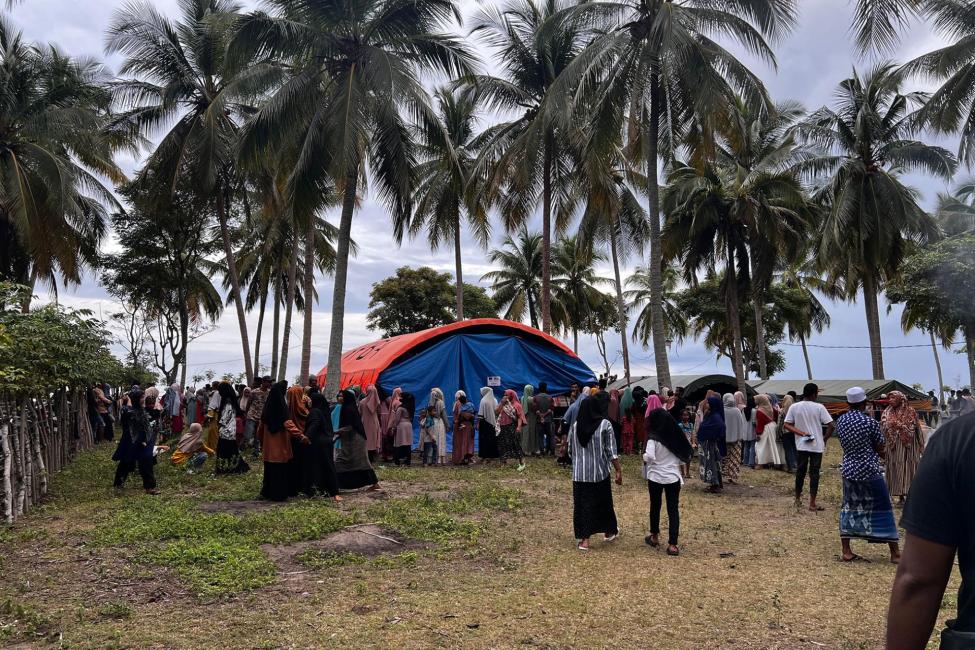-
Who we are
WHO WE AREThe International Organization for Migration (IOM) is part of the United Nations System as the leading inter-governmental organization promoting since 1951 humane and orderly migration for the benefit of all, with 175 member states and a presence in over 100 countries. IOM joined the United Nations system in September 2016.
About
About
IOM Global
IOM Global
-
Our Work
Our WorkAs the leading inter-governmental organization promoting humane and orderly migration, IOM plays a key role to support the achievement of the 2030 Agenda through different areas of intervention that connect both humanitarian assistance and sustainable development.
Cross-cutting (Global)
Cross-cutting (Global)
- Data and Resources
- Take Action
- 2030 Agenda
IOM, World Bank, Government of Somalia to Provide Lasting Solutions for 71,000 People Affected by Drought
Mogadishu – The International Organization for Migration (IOM), the World Bank and the Federal Government of Somalia launched a new USD 20 million project to tackle the pressing needs of 71,000 displaced and vulnerable people affected by the historic drought and a deepening hunger crisis.
The project will provide emergency relief and enhance abilities to recover and adapt through long-term housing solutions and infrastructure development.
“The project comes at a critical time as the most severe drought in four decades pushes millions of people further into poverty, starvation and displacement, with thousands at risk of eviction,” said Ewa Naqvi, IOM Deputy Chief of Mission in Somalia during the launch of the project.
Having typically left rural areas, most displaced people live in informal settlements located on the outskirts of cities where they face also fear and intimidation. Unclear tenure arrangements put displaced populations at high risk of forced evictions. So far in 2022, there have been more than 29,000 recorded forced evictions in urban centres and around a quarter of the people evicted were displaced by the current drought.
IOM is leading the Danwadaag Durable Solutions Consortium – a group of local and international non-governmental organizations (NGOs) focused on providing long-term solutions to protracted displacement – and will work under the leadership of the Federal Government of Somalia to provide critical services to communities impacted by the drought, which has already displaced over 1.1 million people.
"As part of our Government's response to the drought crisis, my ministry will provide emergency support to around 71,000 people in the municipalities of Garowe, Mogadishu and Kismayo. IOM and its partners will implement the USD 20 million project to urgently address the water, sanitation, shelter, health and nutritional needs of drought-affected families,” said H.E. Ismail Abdirahman Sheikh Bashir, Ministry of Public Works, Reconstruction and Housing during the launch.
Those displaced during this two-year-long drought join millions of other internally displaced persons (IDPs) living in precarious conditions following decades of conflict, economic crisis and climatic extremes and likely to never return home. One of the most vulnerable groups in Somalia, displaced people face limited access to basic services and struggle to make a sufficient living.
The Somalia Urban Resilience project will step in to support targeted displaced families and improve relationships with host communities before evictions take place.
‘’The ability to help municipalities address critical lifesaving needs of people affected by drought is a significant step forward in the World Bank’s objective to provide holistic support to the Somali government. We look forward to a productive collaboration with the Danwadaag Consortium, led by IOM,” said Kristina Svensson, World Bank Country Manager for Somalia.
The Somalia Urban Resilience Project will also provide housing solutions including title deeds and land where families at risk of eviction can permanently settle and restart their lives, as well as legal support on rights and lease agreements.
The project will focus on increasing access to health services and engage community members to build infrastructure such as improved shelters, boreholes, latrines, streetlights and drainage systems. A key aspect of the project will involve strengthening the Government´s capacity to deliver essential services to people across Somalia. This project also responds to the implementation of the IOM Strategy on Migration, Environment and Climate Change 2021-2030.
The tailored and inclusive services under this project will also reduce marginalization, promote sustainable integration and effectively lay the foundations for increased resilience in Somalia´s urban centres.
****
For more information, please contact Claudia Rosel, IOM Somalia Media and Communications Officer: cbarrios@iom.int

